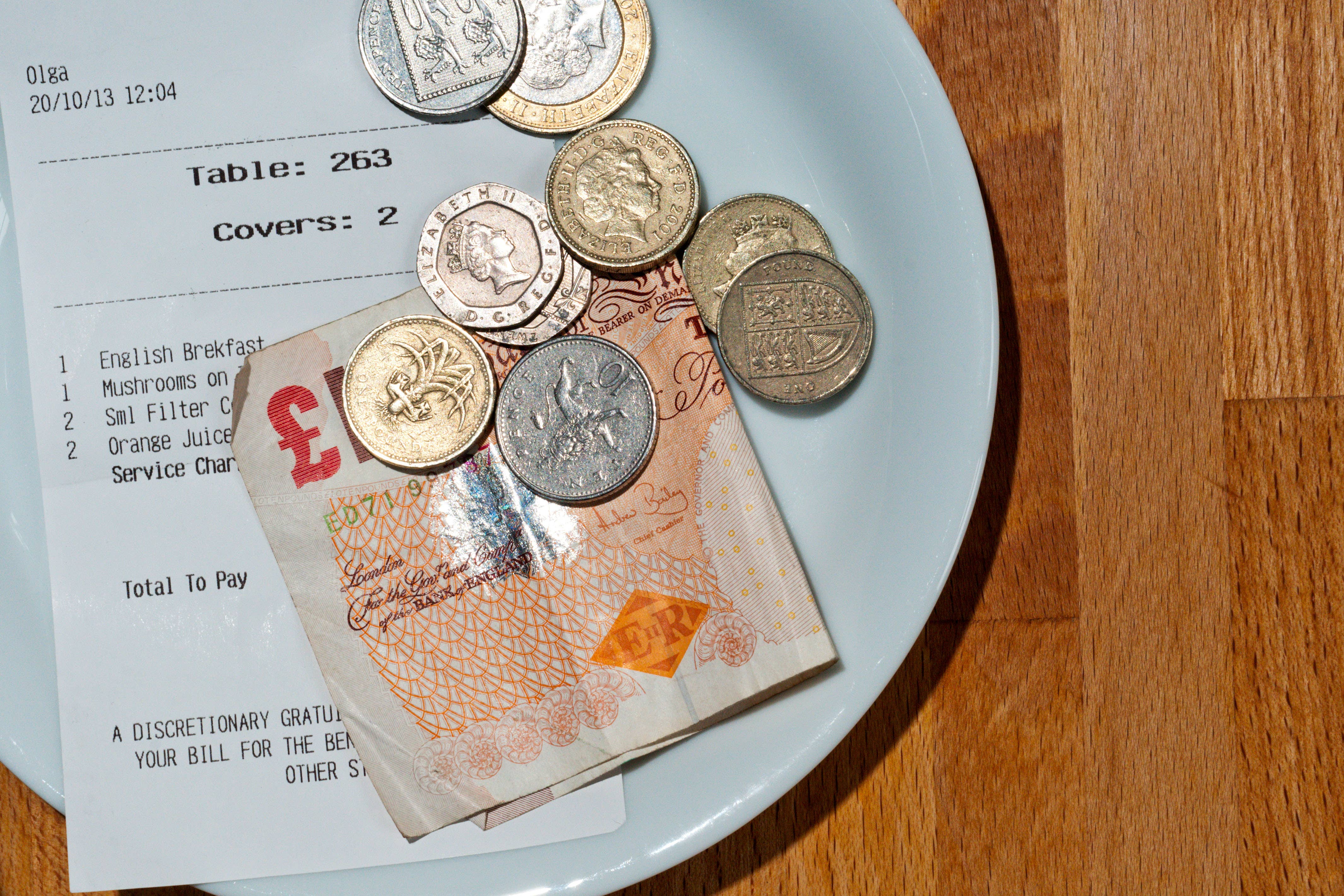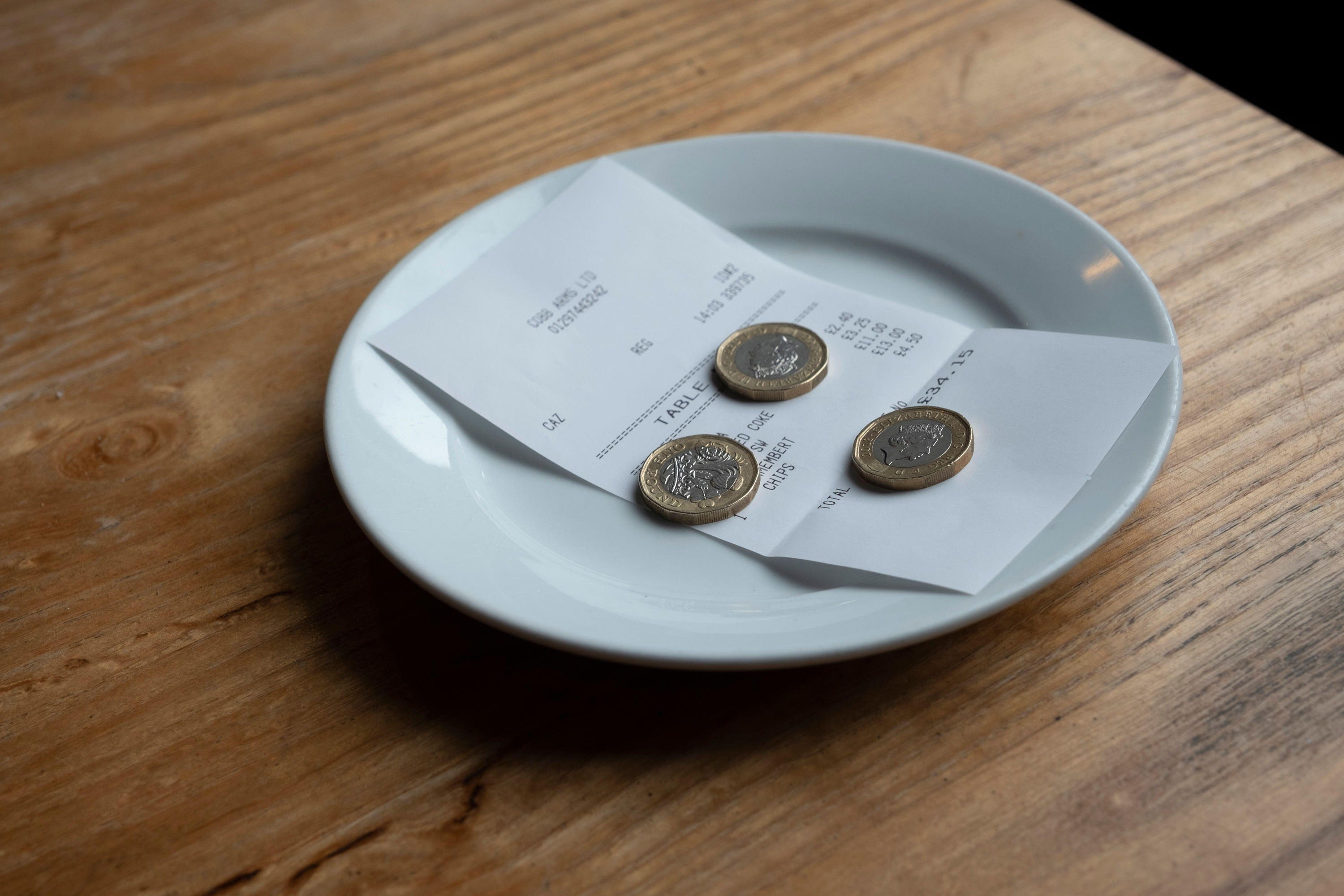The Great Tipping Debate: Has charging for service gone too far?
As new legislation comes into force, the row over who to tip and how much to tip has been reignited. Restaurant owners says they are a life-line, while customers argue that adding a service charge to every bill is dishonest and making going out too expensive. Hannah Twiggs and Harriet Mansell slug it out...


It’s a truth universally acknowledged that the British public are generally polite, often to the point of apologising when someone steps on their foot. Yet in restaurants across the UK, an uprising is brewing.
More than a fifth of diners (22 per cent) are boldly opting out of paying optional service charges, according to new research by RSM UK. It seems the national penchant for avoiding a fuss has finally met its match in the form of a sneaky 12.5 per cent now routinely tacked onto the bill.
It’s the tipping point, quite literally, where dining out in the UK becomes an exercise in ethical gymnastics. Do you dutifully cough up while secretly seething at being robbed of just leaving a few quid tip, or do you, like more than a fifth of Brits, gleefully refuse to pay it at all?
In the southwest, east Midlands and Yorkshire, the numbers jump even higher, to more than a third. So much for the stereotype of the overly polite Brit who’d rather drown in a puddle than cause a scene.
I’ve been that person – sitting there, sweating slightly as the bill arrives, shocked at how much the meal has cost and then realising a hefty whack of it is thanks to the “discretionary” service charge. I spend a few panicky minutes calculating whether the service merits the extra charge, but then pay it anyway even if I decide it’s not. It’s the stuff of nightmares, really. And frankly, I’m not alone.
Saxon Moseley, partner and head of leisure and hospitality at RSM UK, suggests that the rising cost of living might be driving this new frugality. With energy bills rocketing and inflation making everything from bread to a pint of milk feel like a luxury, the idea of handing over an extra 12.5 per cent for service that’s been, shall we say, less than stellar, feels like an unnecessary indulgence.
But there’s something else at play here too. Tipping culture in the UK has always been a bit like Marmite. Nearly half of us would prefer to tip at our own discretion without being coerced into a mandatory-feeling, yet supposedly optional, suggested charge.
Rory Cox, owner of The Prancing Stag in Jordanhill, Glasgow, is aware of this simmering resentment. At his restaurant, there’s no added service charge, just a fair split of whatever tips the customers leave behind.
“I’ve always felt it should be up to the guests if they wish to leave the staff a tip or not. Adding one on puts the customer in an awkward position if they then feel they don’t want to tip, if, say, the meal and/or service hasn’t been up to standard,” Cox says. It’s a refreshingly honest approach in an industry that can often leave customers feeling ripped off, whether they’ve enjoyed their meal or not.

Cox also notes the shift from cash to card tips, which means staff now wait until the end of the month to receive their tips – docked for tax and card processing fees. It’s a far cry from the immediate reward of cash in hand at the end of the night, yet another way the dining experience has become increasingly detached from the straightforward pleasure it once was.
And let’s be honest, we’ve all been there. You’ve just finished a disappointing dinner – your steak was overcooked, the wine list looked like it had been pilfered from a petrol station and the service was as sloppy. You’re about to pay the bill when you notice that little line at the bottom, suggesting you add 12.5 per cent for the privilege of enduring a subpar evening. Suddenly, the meal has become extraordinarily expensive for what it was and the idea of opting out doesn’t seem so unreasonable, does it?
Gary Townsend, chef and owner of Elements in Bearsden, outside Glasgow, knows this dilemma all too well. When he opened his restaurant, he wrestled with whether to apply an optional service charge or leave it off entirely.
“We pay the national living wage [£12ph] before tips, and don’t use service as a way of topping up wages either,” he says. In the end, he decided to add a discretionary 12.5 per cent, but with a crucial caveat: 100 per cent of all tips and service charges go directly to the staff.
“We feel this takes some hassle and ambiguity away from our customers and provides them with clarity around how our staff are paid too,” he explains.
It’s an admirable stance, but let’s not pretend all restaurants are run this way. The reality is that many use service charges as a sneaky way to supplement low wages, passing the buck to the consumer. It’s a tactic that leaves a bad taste in the mouth – but many restaurateurs would point to rising operating costs and the unfairness of one waiter being left a tip while kitchen staff go without, in their defence.
New legislation coming into effect on 1 October, which mandates that all tips, including service charges, be fairly distributed among staff, is supposed to level the playing field.
Kate Nicholls, chief executive of UKHospitality, certainly hopes it will make a difference. “These figures show that the overwhelming majority of consumers are more than happy to pay service charges in order to reward hardworking staff.”
And perhaps they are – if the service is exemplary. But shouldn’t good service be part of the job in the first place? Isn’t that what their wages are supposed to cover? It’s not like I’m tipping my postman every time he manages to actually deliver a letter.

Shouldn’t a decent wage come with the expectation that the service will be good anyway? When I go out to eat, I expect a certain level of professionalism and courtesy – it’s part of what I’m paying for when I see those often eye-watering prices on the menu.
Tipping, in my view, should be reserved for those rare occasions when the staff have gone above and beyond the call of duty. Maybe they’ve helped create a special moment by accommodating a surprise celebration, stayed open late because you lost track of time, or perhaps they’ve graciously handled a group of diners who’ve had one too many. That’s when a tip feels truly deserved – when it’s a token of appreciation for something extra, not a top-up for merely doing the job they’re already paid to do.
What we have now is this awkward, convoluted system where service charges and tipping are tangled together, leaving diners unsure whether they’re paying for good service or simply subsidising a broken pay structure.
Nearly a fifth of UK consumers would prefer no tipping or service charge at all, opting instead for staff to be paid well with service included in the menu prices. It’s a notion that’s both radical and simple.
As one diner, Tsara Taylor, I spoke to astutely puts it: “Service charge is a necessary evil in much of the industry as a way to compete on wages because almost everyone does it. We need a mass movement of operators to change, or at least a couple of big brands to go first.”
So next time you’re handed the bill with that little extra at the bottom, don’t be afraid to pause and consider your options. If the service was exceptional, go ahead and reward it. But if it wasn’t, don’t feel guilty about saying “No, thanks”.
After all, dining out should be a pleasure, not a guilt-ridden obligation. Maybe one day, we’ll all look back on service charges as a quaint relic of a bygone era – like smoking in restaurants or jellied eels. Until then, here’s to tipping at our discretion and making dining out just a little less awkward for everyone involved.

Harriet Mansell, chef-owner of Lilac in Lyme Regis, explains how the new rules could be the difference between keeping the doors open or shutting down for good
“The cost of running a restaurant has skyrocketed across the board – everything from goods to utilities to staffing. We’re dealing with price hikes while also trying to be diligent employers. It’s not as simple as raising prices because the moment we do that, we risk scaring customers away. People are watching what they spend, and eating out, for many, is a luxury.
A few years ago, we made the decision to raise wages to combat the staffing crisis. At the time, it felt like the only way to attract and retain employees. But the costs have continued to rise – wages, ingredients, utilities – and while we want to maintain those higher salaries, the margins simply don’t allow for it anymore.
Since the pandemic, we’ve also had to deal with VAT back at 20 per cent, which in the current climate is unsustainable. It’s basic mathematics – money in versus money out and we are being pinched from every angle. After the 5 per cent VAT relief during Covid, which was a lifeline, the jump back to 20 per cent, combined with all these rising costs, has left many restaurants with no profit margin – some are cash flowing until they can no longer do so, and the majority of businesses I have spoken to are currently operating at a deficit.
We’re doing everything we can and looking at avenues to sustain the business, including gradually raising prices to avoid shocking diners, contually auditing costs and evolving our offering. We are actually busier than ever, which is fantastic and testament to many of the things I have already mentioned, but that is increasingly offset by the financial situation we are in.
But if something doesn’t change, we’ll see more restaurant closures. Some businesses are surviving because they have other revenue streams, but independent restaurants like mine are going to need to be far more creative in how we proceed. We need to pay our staff fairly and meet basic costs, but we can’t charge what we need to cover the overheads. It feels like an impossible position.
Tipping is another layer of complexity. Like many others, at my restaurant, we’ve chosen to add a discretionary 12.5 per cent service charge, and many customers do pay it. But increasingly, we’re seeing people refuse or opting to leave a few pounds in cash instead. We always make it clear when presenting the bill that it’s optional, and if a customer asks for it to be taken off, we don’t make a fuss.
I understand times are tough, but what most diners don’t realise is that the service charge is not directly supplementing wages in the way people often think. Staff already have their wages, and tips are more of a “nice to have” – an added incentive that makes the job more appealing by boosting their overall pay with a few extra pounds per hour, something extraordinarily valuable in this climate.
What I’ve noticed is that bad experiences often get substantially more airtime, which creates a negative culture around tipping as well as a sense of distrust. People are quick to assume the worst, but in reality, the majority of restaurants, like ours, operate fairly and transparently when it comes to distributing tips.
In the past we have taken a small percentage from that service charge to cover the administrative costs of handling this charge, and also for breakages, but with the new tipping policy coming in, we will need to seek another way to offset those costs, which is fine but in a time of being squeezed from every angle, it simply falls into the category of how as a business owner you juggle costs to make it work. We are simply doing our best to offer a fantastic service, really look after our employees and navigate the economy.
That 12.5 per cent service charge might seem like a lot from the customer’s perspective, but in reality, it’s a very small percentage of what restaurants need to cover costs. It certainly couldn’t replace the wages we’re required to pay staff. While tips can make a job more attractive, they’re not a lifeline for wages.
With the new tipping legislation, we’ll need to be more transparent about how tips are distributed, and we’re ready to do that. However, without clear guidelines from the government on how to implement the changes, we won’t be altering our current practices just yet. We already believe we’re handling tips fairly.
There’s a growing sense of distrust – customers don’t trust that businesses are being transparent about tips, staff are questioning where their money is going, and employers like me feel the government isn’t understanding or making any concessions for the predicament that the hospitality industry is in. It’s a vicious cycle. I understand that people want to know where their tips are going, and we’re happy to explain it. But the bigger issue is that we’re being squeezed from all sides – taxes, wages, bills – and we don’t have much room to manoeuvre.
Our team now makes more per hour than ever before, yet we’re barely able to meet payroll some months, even in the busy summer periods.
VAT at 20 per cent is impossible at this time, with national living wage increases, price rises across the board coupled with the household budget being squeezed... something needs to give. I’ve reached out to my MP about the issue, but I haven’t heard back yet. The government doesn’t seem to understand that without some relief, independent restaurants like mine won’t have the capacity to buffer this situation forever.
We’re not just talking about a few closures here and there; this will fundamentally change the high street. I’m determined to keep going for as long as possible, and have unwavering determination and passion, but without some intervention, what I’m saying is that I’m uncertain as to the longevity of much of the industry.
Widespread tenacity is a hallmark feature of the hospitality industry across the board, but they need some relief right now to keep going. Simply put, it’s not just about restaurants closing – it’s about the local communities that rely on them, the tourism they support, and the jobs they provide. The tipping legislation is just one part of a much bigger problem.
Something needs to give.”
THE NEW RULES EXPLAINED
- The new tipping legislation requires businesses to distribute all qualifying tips fairly and transparently to workers according to a new Code of Practice.
- The legislation applies to employer-receieved or worker-received tips, as well as vouchers, stamps, tokens, casino chips or anything with a monetary value capable of being exchanged for money, goods or services.
- Tips cannot be subject to deductions, including administrative fees, and must be paid by the end of the following month after they were paid by the customer.
- Employers must implement a written tipping policy and retain a record of total tips received and details of their allocation to staff for up to three years.
- All workers, including agency, have the right to request tip records and challenge distributions via employment tribunals within 12 months.




Join our commenting forum
Join thought-provoking conversations, follow other Independent readers and see their replies
Comments